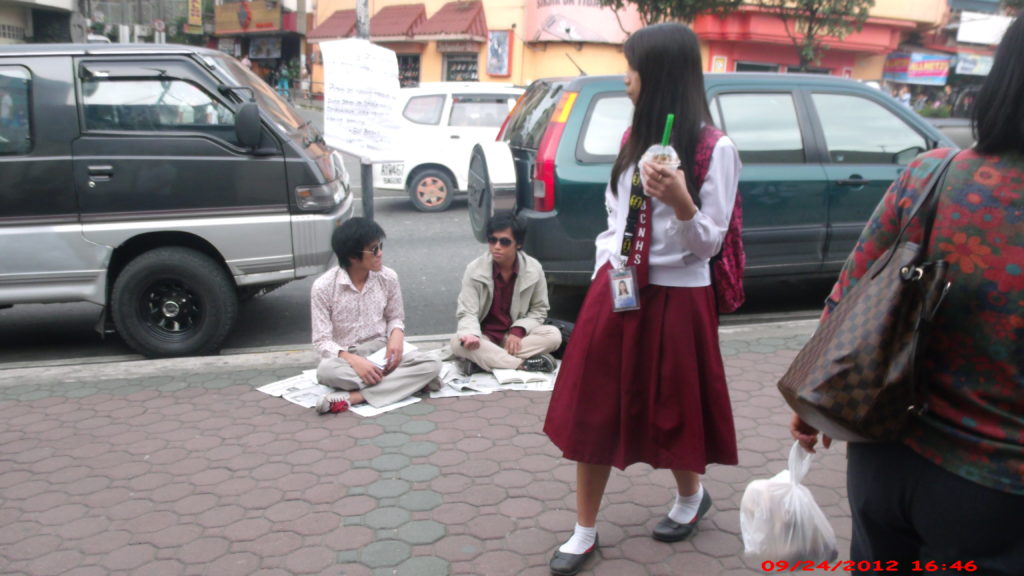ON FROGS AND ORCHESTRAS: INTERVIEW WITH LEVI MASULI
In an interview, Levi Masuli of Pedantic Pedestrians talked about his project of recording frog sounds across the metro, the sonic dimension of ecosystems and how the pandemic might have changed soundscapes.
Ivan Emil A. Labayne and Levi Masuli are part of Pedantic Pedestrians (PP), a laboratory for experimenting with modes of cultural production. PP has launched four folios online, held a book launch without a book, released an Oncept Series and helped organize a small press expo in Baguio City.

Ivan Emil A. Labayne: Early this year, you mentioned your plan to volunteer as a research assistant to record frog sounds in Southern Luzon. Is it correct—Southern Luzon? The task is part of a research of an office based in Los Baños, Laguna where you also planned to relocate from Quezon City. What drove you to make this decision—both the recording of frog sounds and the relocation to a city outside Metro Manila?
Levi Masuli: Recently, I became interested in frog sounds. I was reading something about acoustic ecology when I came across a hypothesis that when animals share the same habitat, they tend to exploit vacant spectrums to avoid spectral or temporal overlaps. For instance, flycatchers (Empidonax minimus) insert their short songs between the longer songs of the red-eyed vireos (Vireo olivaceus). In short, animals and insects don’t sing over each other, and they don’t just sing whenever they want. They make space for others, either through leaving lulls for others or by vocalizing in a particular spectrum range.
This explains why when a certain frog species creates a bass-y croak, you won’t find another species in the vicinity with a similar croak. You’ll more likely find another species or creature with a higher-pitched vocalization. Thus, nature is literally a self-orchestrated orchestra, or a well-balanced surround mix – in high definition!
This hypothesis also posits that more established ecosystems have more complex interspecies coordination. Newer ecosystems or those recently disturbed have less complex soundscapes. This is because the species need time to figure out how to organize their vocalizations and make everything harmonious.
Following this hypothesis, I wanted to move away from the metro to look for more complex soundscapes where there is more interspecies coordination. Nonetheless, I recently realized that it would also be interesting to listen to the changes in the soundscapes in the urban areas, given that the dramatic change in human mobility (due to the lockdown) may have led to the flourishing of certain urban ecosystems. To be honest, I don’t want to put too much emphasis between urban and rural ecosystems, as it implies one is more ‘pure’ or complex than the other. Nature changes may it be in the city or the countryside. Ecological disturbances happen everywhere. It’s just a matter of paying attention to the details.
Ivan: I find nice the point you made about animals “avoid[ing] spectral or temporal overlaps,” as if making way for each other; it’s opposite sense in Filipino, hindi sila nagsasapawan; they do not try to top each other, as if competing. This rhymes with your later point about nature being “a well-balanced surround mix” and perhaps also to your quest for “more complex soundscapes where there is more interspecie coordination.”
Speaking of coordination and balance, I’d like to ask you about “disciplines” or “fields”—words that tend to smack of connotations of segregation. Your academic background is on literature, language, the arts and now you are transitioning—if you approve of that term—to this new field, this new undertaking.
How was it like: what do you think helped in redirecting your interest from the arts to the natural environment? Or, to follow a different premise: how do you think your literary and arts background relate to your current interests in the natural environment and sound?
Levi: The segregation of disciplines is a recent phenomenon. After all, the firsts naturalists in the Philippines were priests. I don’t see it as a transition. Scientists also write, and poets live in the same natural and sonic world as everybody else does. The only difference is the training, the technical knowledges, things that can be bridged by collaborating with others and doing your own research.
Ivan: I want to know more about your familiarity with, and deployment of the scientific names of species. You evinced this in your first response, in relation to flycatchers and the red-eyed vireos. In a video you uploaded weeks ago, I noticed how you gave the scientific name of the frog whose croak you recorded. Is this deliberate on your part—becoming familiar with scientific names, and using them, where possible? If so, what significance do you attribute to these?
Levi: It’s deliberate simply because it is practical to know them. It also helps to know the local names.
Ivan: Are you currently pursuing other projects that relate to, or inspired by your interest in the natural environment, or the natural sciences in general?
Levi: I am looking to record as much frog sounds as I can during the rainy season as this is when they are most active.

Levi Masuli, currently based in the Philippines, works primarily with sound and text. He is part of the writing group, Pedantic Pedestrians. His work can be viewed at https://levimasuli.com/.

Ivan Emil A. Labayne is a researcher, teacher and freelance writer, maintaining columns in local weeklies Northern Dispatch and Baguio Chronicle. His creative and critical works are published in journals Kritika Kultura, The Cordillera Review, Entrada, Hasaan and Katipunan and in online platforms Cha, Jacket2 and New Mandala. He blogs here.

 BACK TO ISSUE
BACK TO ISSUE